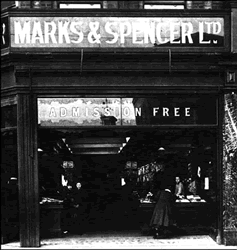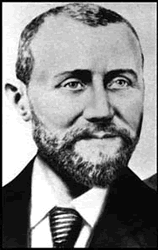From Wikipedia, the free encyclopedia
Michael Marks, (June 1859 – December 31, 1907), was one of the two co-founders of the retail chain Marks and Spencer.Marks, who was born in Slonim, Russia, emigrated to England as a young man. He moved to Leeds where there was a company called Barran that was known to employ Jewish refugees.Marks met Isaac Dewhurst, the owner of a Leeds warehouse, in 1884. A deal was arranged whereby Marks agreed to buy good from Dewhurst and then to sell them on in villages around Leeds. The venture was a success and enabled Marks to raise enough capital to establish a stall in Leeds' open market. He also sold goods at Castleford and Wakefield markets.Marks also took the decision to rent an area at the new covered market in Leeds, which traded on six days of the week. Famously one of his stalls sold goods that only cost one penny. Next to the stall was a poster with the words "Don't Ask the Price, It's a Penny". Over the next few years Mark's expanded his business and opened similar stalls in covered market halls all over Yorkshire and Lancashire.In 1894, Marks decided that if he was to further expand the business he would need to find a business partner. He initially approached Isaac Dewhurst who decided against the offer but suggested that his cashier, Tom Spencer, might be interested. Spencer decided that the £300 required for a half-share in the business would be a good investment.The running of the business was split with Spencer managing the office and warehouse whilst Marks continued to run the market stalls. Spencer had developed some important contacts while working for Isaac Dewhurst and this allowed him to get the best prices for goods by dealing directly with the manufactures. Together Spencer and Marks were able to open stores in Manchester, Birmingham, Liverpool, Middlesbrough, Sheffield, Bristol, Hull, Sunderland and Cardiff.A new warehouse in Manchester was built in 1897. This store became the centre of a business empire which now included thirty-six branches. New stores had been built in Bradford, Leicester, Northampton, Preston, and Swansea.London now had a total of seven branches.On 5 May 1897, Marks was naturalised as a British subject.In 1903 Marks & Spencer became a limited company and Spencer's original £300 investment had risen to a value of £15,000 and he retired later that year. Michael Marks continued to develop the business until his death in 1907.Retrieved from "http://en.wikipedia.org/wiki/Michael_Marks"
Marks & Spencer at Croydon in 1906
Michael Marks was born in Slonim, Russia in 1859. As a young man Marks emigrated to England. Without a trade and unable to speak the English language, Marks moved to Leeds where there was a company called Barran that was known to employ Jewish refuges.
In 1884 Marks met Isaac Dewhurst, the owner of a warehouse in Leeds. The two men arranged a deal where Marks agreed to buy good from Dewhurst and to sell them in the numerous villages around Leeds. The venture was a success and Marks soon raised enough money to establish a stall in Leeds' open market. He also sold goods at Castleford and Wakefield markets.
Marks also decided to rent an area at the new covered market in Leeds that traded six days a week. On one of his stalls Marks sold goods that only cost one penny. Next to the stall was a big poster with the words: Don't Ask the Price, It's a Penny. Over the next few years Mark's opened similar penny stalls in covered market halls all over Yorkshire and Lancashire.
In 1894 Marks decided he needed a partner to help him expand the business. He approached Isaac Dewhurst who decided against the offer but suggested that his cashier, Tom Spencer, might be interested. Spencer had been watching the career of Michael Marks for sometime and considered the £300 required for a half-share in his business to be a good investment.
It was agreed that Spencer would manage the office and warehouse whereas Marks would continue to run the market stalls. Spencer, who had developed some important contacts while working for Isaac Dewhurst, was able to get the best prices for goods by dealing directly with the manufactures. With the help of Tom Spencer Marks was able to open stores in Manchester, Birmingham, Liverpool, Middlesbrough, Sheffield, Bristol, Hull, Sunderland and Cardiff.
In 1897 Marks & Spencer built a new warehouse in Manchester. This now became the centre of their business empire that now included thirty-six branches. New stores had been built in Bradford, Leicester, Northampton, Preston, and Swansea. London had seven branches including those at Brixton, Kilburn, Islington and Tottenham.
In 1903 Marks & Spenser became a limited company. Spencer's £300 investment was now worth £15,000. Tom Spencer retired later that year but Michael Marks continued to develop the business. 1906 was a record year for the company with several stores taking over £4,000 a year. This included Liverpool (£9,857), Brixton (£9,766), Leeds (£8,701), Manchester (£8,459), Bristol (£6,242), Newcastle (£5,482), Hull (£4,513) and Middlesbrough (£4,064). Michael Marks collapsed and died on 31st December, 1907.

